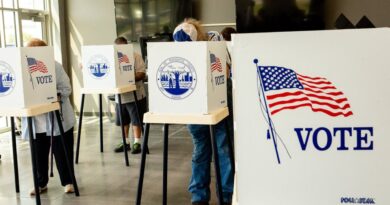Lawyers cite Trump’s election ‘suspicions’ in fight against sanctions
Six lawyers facing sanctions in Michigan over their attempt to reverse the state’s 2020 presidential election say “suspicions” about the vote in “the highest levels” of government are among the reasons they should not be penalized.
Southfield attorney Donald Campbell, who’s representing Sidney Powell and other lawyers in Detroit U.S. district court, filed a brief Monday, levying a variety of arguments for why Judge Linda Parker should deny motions for sanctions. The document came two weeks after the judge in Michigan’s Eastern District held a high-profile, six-hour hearing on the subject.

“In this case, the attorneys didn’t just have suspicions based merely on their own beliefs,” Campbell wrote Monday. “They had evidence that those working at the highest levels of the United States government shared their suspicions.
“That context makes this case exceptional — and it is a reason for the court to deny their defendants’ and intervenors’ requests for sanctions.”
Much of the debate has focused on whether the legal team that sought to have Trump named Michigan’s winner properly vetted affidavits from individuals who claimed they witnessed wrongdoing in the election and other analyses they submitted to try to bolster their effort.
Trump lost Michigan to Democrat Joe Biden by 154,000 votes or 3 percentage points. Despite unsubstantiated claims from fraud, a series of court rulings, dozens of audits by election officials and bipartisan boards of canvassers as well as an investigation by state Senate Republicans have reinforced the outcome.
But Campbell wrote Monday that the attorneys who brought the case were not the only individuals who viewed claims about the state’s election included in affidavits as “evidence of serious fraud.” When the case was filed in late November, members of two of the federal government’s three branches, including Trump, “were insisting that there was massive voter fraud,” Campbell said.
“Many Americans instantly disregarded those claims,” he added. “But millions of other Americans believed those claims — and believed that their president would not intentionally mislead them.”
Campbell is representing Powell along with Gregory Rohl, Brandon Johnson, Howard Kleinhendler, Julia Haller and Scott Hagerstrom.
The attorneys filed their Michigan case on behalf of six Republicans, asking Parker to name Trump the winner. In total, nine lawyers, including national conservative figures Powell and Lin Wood of Georgia, have been involved in the litigation. They cited conspiracy theories about voting machines and unproven assertions of fraud in their arguments.
Parker rejected the challenge on Dec. 7, saying the suit seemed “less about achieving the relief” the GOP plaintiffs sought and “more about the impact of their allegations on people’s faith in the democratic process and their trust in our government.”
Afterward, Michigan Attorney General Dana Nessel, Wayne County voter Robert Davis and the city of Detroit asked Parker to impose sanctions, including financial penalties, on the attorneys who represented the Michigan Republicans.
During the July 12 hearing, lawyer David Fink, who’s working on behalf of Michigan’s largest city, drew connections between the Michigan lawsuit and the Jan. 6 insurrection at the U.S. Capitol.
“Because of the lies spread in this courtroom, not only did people die on Jan. 6, but many people throughout the world … came to doubt the strength of democratic institutions in this country,” Fink said.
But in his new brief, Campbell said the attorneys had filed nearly 1,000 pages of evidence and performed “immense work,” which, he argued, demonstrated their complaint was “not baseless.” He also said there were procedural problems with the way the motions for sanctions had been administered.
Campbell said Davis and the city of Detroit had chosen to intervene in the case, “volunteering to spend time and money in this litigation even though they were not sued.” If the claims were frivolous, they had no reasonable basis to believe that the state’ counsel needed assistance, he said.
cmauger@detroitnews.com


